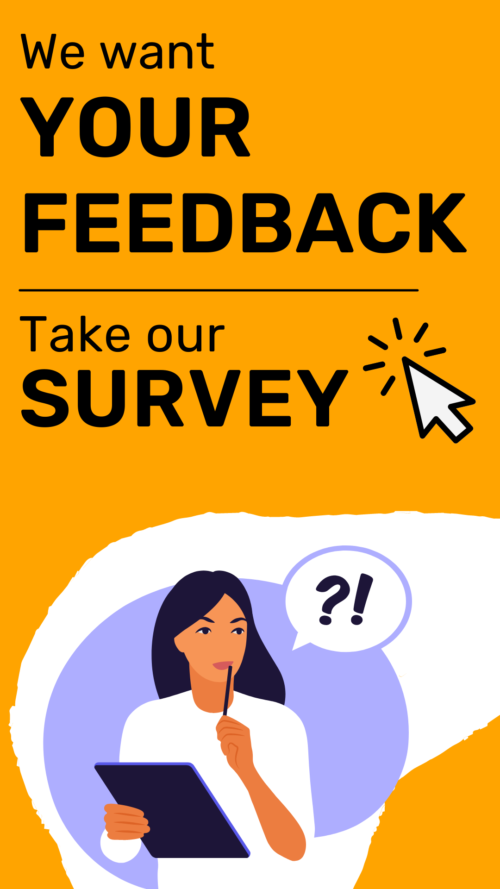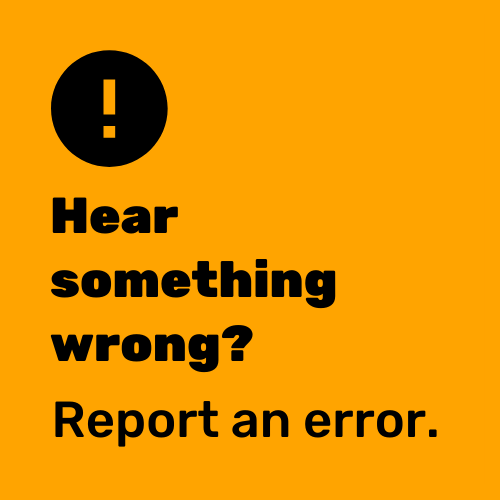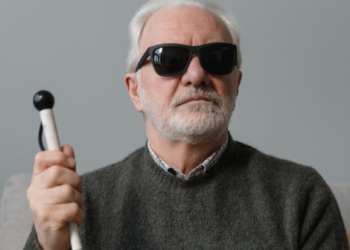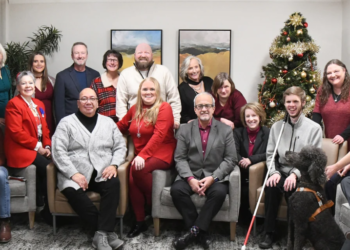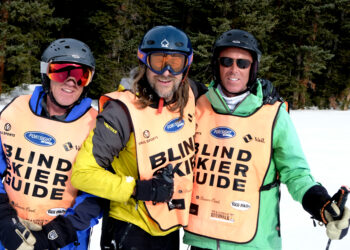5 Self-Advocacy Scenarios for People with Vision Loss
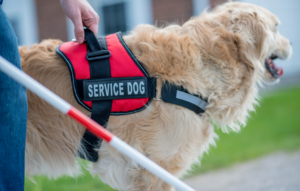
Living with vision loss is a different experience for everyone, but one thing is always true: The ability to speak up for yourself and take charge of your life is critical to your independence and well being.
Continue reading to learn about these common scenarios in everyday life, your legal rights to accessibility, and what you can do to advocate for yourself and others.
- Lyft or Uber Refused to pick me and my service animal up.
- I can’t read the restaurant menu.
- My doctors office didn’t have a private way for me to fill out medical forms.
- My course content isn’t accessible.
- TSA at the airport took my cane from me.
Notice: When you need to take things further
While this article will focus on your rights and self-advocacy tips, it’s important to know that reporting a violation of your rights to the Department of Justice is always an option. This can be done anonymously, if you choose. Once submitted, the U.S. Department of Justice will review your report and may mediate or investigate the situation and help you find resources. This option, however, can take several weeks. If you need immediate legal help, you can Contact Legal Services Corporation or find a lawyer through the American Bar Association.
Other circumstances:
- If you are in danger, contact 911
- If you are reporting misconduct by law enforcement or believe you have experienced a hate crime, please contact the FBI.
What is accessibility?
The legal definition from the Office of Civil Rights is:
“Accessible” means a person with a disability is afforded the opportunity to acquire the same information, engage in the same interactions, and enjoy the same services as a person without a disability in an equally effective and equally integrated manner, with substantially equivalent ease of use. The person with a disability must be able to obtain the information as fully, equally, and independently as a person without a disability.”
1. Lyft or Uber Refused to pick me and my service animal up.
The law:
This is called “Service Animal Denial” – and yes, it is 100% illegal. Drivers of Lyft, Uber, and other ride sharing services are required by law to serve you and your service animal, regardless of the driver’s allergies, religious or cultural objects, or fear of animals.
Your Responsibilities:
Your service dog is not required to wear any kind of proof that it is a service animal, however you may need to communicate with the driver that your dog is a service animal. The driver does have the right to ask you two questions that you should be prepared to answer:
- Is the animal required because of a disability?
- What work or task has the animal been trained to perform?
What to do about it:
If a driver refuses you, we encourage you to report them. They will be investigated and could face immediate and permanent deactivation.
- Call Lyft’s Service Animal Hotline: 1-844-554-1297
- Learn more about Lyft’s Service Dog Policy
- Learn more about Uber’s Accessibility Policies
2. I can’t read the restaurant menu.
The law:
Oftentimes, restaurants will fail to make their menu accessible – or, at best, they will have a sticky braille menu in the back that is outdated and tattered. All businesses open to the public have a legal obligation to ensure those with disabilities have equal access to the services, activities, and goods.
Your Responsibilities:
It is up to you to advocate for what you need – however you are not required to provide proof of disability in order to be accommodated at a restaurant.
What to do about it:
- Ask your server if they have their latest menu in braille or large print, or on an accessible website you can access from your mobile device
- If they don’t, you can ask the server to read the menu aloud for you.
- If you feel inclined, inform them and their manager that they can get their menus printed in braille and large print from Braille Works if they want to improve their customer experience, efficiency, revenu and compliance with ADA regulations.
There are some restaurants that have a good reputation for always having accessible menus on hand.
- Applebees
- Chili’s
- Outback Steakhouse
- Red Lobster
3. My doctors office didn’t have a private way for me to communicate with them.
The law:
Privacy at the doctor’s office is extremely important! Under HIPPA and medical privacy rights, you have a legal right to have your information protected by your doctors office. However, many patients that are blind or low vision report incidents where the provider relied on verbal communications in the lobby to fill out inaccessible paper forms, where everyone waiting there could listen in.
Legally, your health care provider must accommodate any reasonable requests to communicate by alternative means or at alternative locations. This could be in a private room or over the phone in seperate locations.
Your Responsibilities:
It is up to you to state clearly that the disclosure of the information in the current circumstance is endangering you.
What to do about it:
- Fill forms out online ahead of time, if possible. Doing this can minimize the possibility of this issue coming up in the first place and will make it a smoother experience for you.
- Health providers are required to have a privacy notice, and you can find a copy of it on their website or you can ask them. In this notice, you can find information about how they keep your information private, instructions for how to get a copy of your records, and contact information if you have questions or need to file a complaint to their HIPAA compliance officer.
- Use electronic records, and remind the provider that there is no need for your provider to start reading aloud your medical records in front of others.
4. My course content isn’t accessible.
The law:
School and higher education materials are often not accessible for students that are blind or visually impaired. This could be online content that is graphic heavy or uses fancy animations that are not screen-reader friendly, it could be a paper textbook that is not available as an accessible e-edition, and often, it is the way the teacher or professor presents the course content at the front of the classroom.
Legally, campuses are required to make their content accessible to all students – and this includes software, websites, videos, PDF files and other IT. In fact, many schools and universities have been sued for the inaccessibility of their content.
Your Responsibilities:
It’s important to know that it is your responsibility to make your disability known to the school and request any accommodations needed. It’s best to arrange accommodations with the school before the course starts so they have time to work with you. The school does have the right to require documentation of the disability, so be prepared to provide that.
What to do about it:
Faculty should already be using accessible tools to teach their students… but in the case that they are not, ask your teacher for an accommodation and they are required to provide. You can also contact your advisor or seek assistance from your schools accessibility or disability office. Reasonable accommodations can include (but is not limited to):
- Interpreters
- Audio Recordings
- Braille Materials
- Computer Programs
- Assistive listening
- Written outlines/summaries of lectures
- Extended time for testing
- Early enrollment to allow time to arrange accommodations
- Rescheduling the class to an accessible location
5. TSA at the airport took my cane.
The law:
You are legally allowed to use your cane for mobility purposes around the airport and in the plane, and it won’t be counted towards your carry-on luggage limits. However, during the security checkpoints, TSA does have the right to temporarily take your canes, braille note-takers and other aids for a short period of time to undergo X-ray screening.
Your Responsibilities:
You are required to undergo the security checks, including any pat-downs. However, it’s up to you to inform the TSA officer that you are blind or low vision if you need assistance, and to inform them you will need to be immediately reunited with the device after it is screened. You may provide the officer with a TSA notification card or other medical documentation to describe your condition.
What to do about it:
- Get PreChecked: Getting your TSA PreCheck will make the security checkpoint much faster, and may save you from some parts of security, such as removing your shoes and belts.
- Contact TSA Cares helpline for additional assistance through the screening checkpoint: (855) 787-2227
- Arrive at the airport at least one hour before boarding to have extra time if special assistance is needed.
- Ask a TSA officer for assistance, especially if need guidance going through the metal detector without your cane or other assistive devices.
- Label your cane with your contact information. If it is lost or stolen, it will be easier to return to you.
- Bring a foldable cane so you can easily store it by your feet in the plane or in the overhead space. Your cane should never be blocking the aisle.
- If you feel your rights have been violated, or you were subjected to discrimination by the TSA, you can file a complaint with the TSA.
Conclusion:
This article was created as part of our Self Advocacy and Legal Rights Topic of the Month, with the guidance of a focus group consisting of blind, low-vision, and deaf individuals. We hope that these tips and legal overview helps you understand your rights and options when someone isn’t treating you fairly (or legally!) due to your vision loss.
Other resources
- Traveling Safely With Portable Oxygen from the National Council on Aging
Disclaimer: This blog/website is for educational purposes only. It provides general information and a general understanding of the law, but does not provide specific legal advice and should not be used as a substitute for competent legal advice from a licensed attorney.
This article was provided by the Audio Information Network of Colorado (AINC), a non-profit serving the blind and visually impaired community since 1991. Please consider making a donation for Colorado Gives Day on December 6th to support their efforts.


